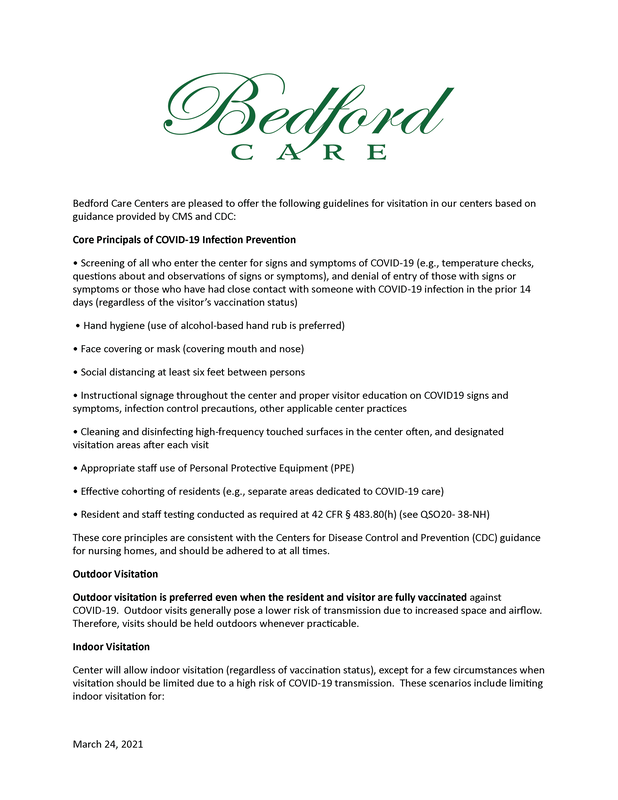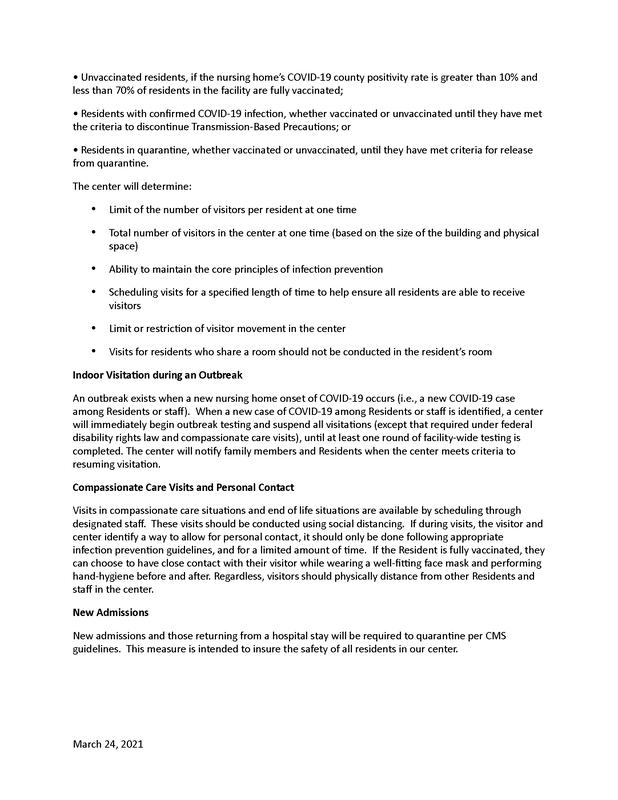|
Barbara Ellington-Lofton, Resident Benefits Specialist
This is the time of year for summer vacations or for coming home to visit relatives. For many adult children coming to town for a visit, the joy and excitement are replaced with anxiety and fear. You come to town and find out that your parent is not as functional as last time. You see warning signs - expired food, prescription bottles that have too many or too few pills for the dosage, a state of appearance that does not meet minimal health standards, weight loss, unopened mail such as bills or bank statements. At this point you have 2 options: 1. Survive the visit and leave hoping daily you will not get a call that a crisis has occurred. 2. Try to find out what is going on and take steps to resolve before a crisis strikes. Option 2 is surely the best one for all involved. You make an appointment to see your mother's primary care provider. You schedule a checkup for her. You speak with neighbors and friends to see what they have noticed in recent behaviors. This may mean you need to stay in town a few extra days. Your mother, family, and the primary care provider determine that she can no longer manage on her own. Options such as sitter services, assisted living or living with a family member are ruled out. The next option is full time medical care in a nursing home. How do you get there from here? The nursing home admission process is essentially 2 fold. The first is to select one or more facilities that you feel will meet your loved ones needs. As far as COVID restrictions allow, visit the facility. One test you can use is what one of our administrators terms the AA test: Aroma - does the nursing home smell overpower you when you walk in the door? Everyone understands when an event has just taken place and the staff is addressing it. But that should be the exception. The expectation should be for the aroma to be pleasant. Attitude - how does the staff respond to your presence? How do they respond to residents and other visitors? You should be greeted warmly and with a smile. You should observe residents being treated with respect and dignity. Once you select a place, that admissions staff will guide you in the next steps. They will need to review your loved one’s medical condition to make sure their staff can meet all needs. The primary care provider will usually fax the most recent history and physical and medication list to be reviewed by an admission team. Once your loved one is accepted for admission, there are several medical tests and orders required. These have to be completed within 30 days of admission. The second part of the admission process is to determine how nursing home costs will be paid. Medicare does not cover long term nursing home stays. Sometimes Medicare will cover a short term stay of up to 100 days following a 3 day in-patient hospital stay. Medicare Advantage plans may not require the in-patient hospital stay. For long term nursing home stays the options are private pay, long term care insurance, or Medicaid. In Mississippi private nursing home charges are usually $6000-8000 per month. Some long term care insurance policies cover only a portion of this, so paying the difference by private pay or applying for Medicaid are still needed. Medicaid is a government assistance program that is needs based. People on Medicaid must have limited income and assets. The asset limits vary depending on whether the applicant has an at-home spouse and how the asset are structured. For instance, home property valued at less than $500,000 and located in the state of Mississippi is always excluded. The balance of retirement accounts that produce a certain amount of income is not counted. The current gross monthly income limit is $2523. Those whose income exceeds this limit may still qualify by agreeing to pay income less exclusions to the nursing home. Conclusion: The trip home for food, fellowship, and family got a lot more complicated. But with time, energy, and resources, you can return home knowing mom is in a safe place and her needs are being met with the highest quality of care and compassion. Barbara Lofton can be reached by phone at 601-450-3744 or by e-mail at blofton@bedfordcc.com. We are so excited that our Centers are now open for visitation. To keep our Residents safe and Covid-free, we have implemented Indoor Visitation Guidelines. Before visiting, please take a moment to read through these important measures, then contact your Bedford Care Center to schedule a visit! As always, Thank you for choosing Bedford Care. We look forward to seeing you soon!
By: Barbara Ellington-Lofton
You may have read my articles in Healthy Cells for several years. If so, you know they usually address issues of long-term care Medicaid. Because I work with Bedford Care Centers, my articles are about nursing homes – admission, benefits, where to begin, and what to expect. Would you be shocked to learn that Mississippi Medicaid covers much more than nursing home care? Nursing home income and asset limits are usually much more liberal than those for at home Medicaid. But today we’ll see that there are some Medicaid programs that cover individuals living at home and are just as liberal in income and asset requirements. And some individuals who continue to work can be covered while remaining in the workforce. Over 40 years ago, a program was established to provide Medicaid benefits and some additional services to a group of individuals who could qualify for Medicaid in a nursing home, but chose to remain at home. Initially these were offered only to those who qualified for Supplemental Security Income (SSI). Through the years both income and asset limits have increased, and now are the same as those for nursing home residents. These are the MS Medicaid Home and Community Based Service (HCBS) waivers. There are waivers for the Elderly and Disabled, Assisted Living, Independent Living, Intellectual Disability/Developmentally Disabled waiver, and the Traumatic Brain/Spinal Cord Injury patients. They require being age 65 or older, or with a level of disability that is the same as that for Social Security or SSI, and needing a nursing home or institutional level of care, but electing to remain in a private living arrangement. These waivers can serve a limited number of individuals at any one time, resulting in waiting lists, some as long as 2 years, and some longer. But once accepted into the waiver and approved for Medicaid, services such as personal care attendant services, assistance with bathing and dressing, and assistance with other ADL’s (assistance with daily living) can be provided as a service covered by Medicaid. Another program is the Disabled Child Living at Home. This program came about as a federal requirement that allows children who would qualify for care in a hospital, nursing home, or other institutional setting, to qualify for Medicaid at home without consideration of parental income or assets. The child must be under age 21, meet the Social Security definition of disability, and meet the requirement for care in a nursing home or other institution. Federal law also requires that children under age 21 who qualify for Medicaid be provided expanded benefits that are medically necessary, whether or not they are covered by the Medicaid state plan. Of course, these expanded benefits can be difficult to access, and many time advocacy groups can assist in this process. In July 1999 the MS State Legislature instituted a program to allow individuals who work in spite of disabilities to be covered by Medicaid. The basic eligibility requirements for the Working Disabled Program are that the individual work at least 40 hours per month at some paid activity. The paid activity does not have to be one that produces a paycheck (but all wages should be reviewed for federal and state tax requirements). The person must also meet the definition of disability set by the Social Security Administration for Social Security disability and/or SSI, except for meeting the provision of Substantial Gainful Activity. The earned income limit is 250% of the Federal Poverty Level and the unearned income limit is 135% of the Federal Poverty Level. The countable asset limit is $24,000 for an individual and $26,000 for a couple. Some assets, such as a home, one car, and some retirement accounts, are not countable. Mississippi Medicaid has 40 + Categories of Eligibility. The Medicaid Regional Office is charged with determining which category will be most beneficial for you, provided all technical factors are met. The Medicaid website, www.medicaid.ms.gov, provides information and flyers about different categories, income and asset limits, and benefits offered. When you hear “Medicaid,” my hope is that you now know that Medicaid offers many categories with different income and asset rules, and varied benefits and services. Barbara Ellington-Lofton is a Resident Benefits Specialist for Bedford Care Centers. She can be reached by phone at 601-450-3744 or e-mail at blofton@hmpmc.com.. Being a caregiver is a difficult task, no matter the time of year. However, the difficulty of being the sole caregiver for another person can be elevated especially during the holiday season.
Being a primary caregiver is a 24/7 hour seven day a week job and with all of the responsibilities that accompany caregiving who has time to decorate a Christmas tree? Who is going to bake the cookies and plan Christmas dinner? Who is going to do the Christmas shopping plus wrap all the presents? Being a caregiver shouldn’t mean that you miss out on the holiday traditions that are meaningful to you and Bedford at Home is here to help you most of your most of your holiday season and enjoy making precious memories with your loved ones. Here are some ways you can recognize and reduce the stress of caregiving during the Holiday Season. Be Aware of Possible Burnout Caregiver burnout can happen at any time, but is particularly common at Christmastime. The holiday season is a time of joy – a time to partake of family traditions, share memories with old friends, and celebrate the beginning of a New Year. Christmas and the holidays produce high levels of emotional stress. Isolation, depression and guilt can lead to a caregiver’s breakdown. Here are some signs that you may be experiencing caregiver burnout:
Why Holidays Mean Extra Stress Only the person who has walked in a caregiver’s shoes for months at a time can know what the job of a caregiver is like. The caregiver that has no outside help and no support system is a sure candidate for burnout. Any one of the most common caregiver duties can weigh a person down both mentally and physically:
How can I Reduce the Burnout and stress for the Caregiver in My Life? A primary caregiver is usually too caught up in her role to celebrate the holidays. She feels guilty for not upholding family traditions like baking cookies and decorating the house. Knowing her family’s (and her own) disappointment gets her down until depression takes hold. How can relatives help when they don’t live in the same house – or even the same town as the caregiver? If you plan to visit a friend or relative who is a caregiver, plan to stay in a nearby hotel or at another relative’s home. Few things are more stressful than a houseful of company, especially for the caregiver of a dependent elderly person. It’s a thoughtful idea to let the caregiver know well in advance that travel and visiting plans won’t disrupt her household. Knowing guests will stay in a hotel and have plans to eat out will help relieve the extra pressure. Good communication will save a lot of wear and tear on her nerves. Avoid criticizing the caregiver’s home. Whether it’s a living room that needs dusting, dirty dishes still in the dishwasher or some other fault, don’t say anything (unless of course there is a real health concern). Pitch in and do a little housekeeping – mop the floors, empty the garbage cans or dust the living room – if the gesture will be accepted without putting more guilt on the caregiver. Don’t expect to be fed or entertained. A primary home caregiver rarely has time to go to the grocery store, much less make a big holiday dinner. Why not take the caregiver out for a meal? Or, if she can’t leave the house, then why not bring dinner already prepared to her home? Do whatever works best with the least amount of work for the caregiver. Prepare for Holiday Changes Caregivers should be prepared to accept changes in family holiday celebrations especially when a patient begins to decline. Giving up hosting Christmas dinner for the entire family may be tough, but there is no joy in being overworked and overwhelmed for the sake of tradition. A solution may be to alternate hosting duties between family members. In any case, a well planned, well delegated list of duties to share in meal preparation, decor and clean up will help those holiday events be a little easier. If changes are necessary, accepting those changes early on is in the best coping for the caregiver and the loved one. If attending events outside of you home is impossible for the caregiver or the patient, you may be able to “Facetime” or ‘Skype” so that you can connect with loved ones. Don’t Be Afraid to Ask for Help If you are a primary caregiver, don’t be afraid to ask for help. If you have local friends and family, ask them to pitch in and help you make it through the holidays. Bedford at Home is a locally owned company offering services provided by CNA’s,LPS’s,RN’s and Personal Care assistants. We offer short and long-term respite services, including but not limited to: Travel Companions, sitting with your loved one during hospital and long-term care stays, or just providing relief when you need a day off. All services are available 24/4, including weekends and holidays. Bedford at Home wants to help you be the best caregiver you can be. For more information, call us at 601-271-6004 or visit us online at bedfordathome.com |
Categories |
Managed by Resonate Marketing Solutions




 RSS Feed
RSS Feed